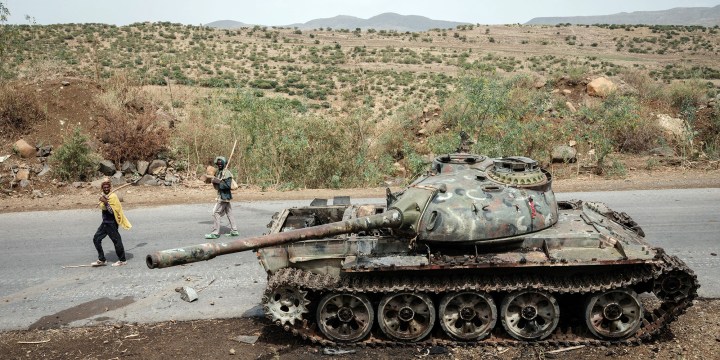ISS TODAY OP-ED
Ethiopia’s exclusive National Dialogue approach may worsen ethnic division without much-needed political closure

The dialogue’s first phase is proceeding without opposition, but the format is unlikely to achieve ‘national consensus’.
In December 2021, at the height of the war between Ethiopia’s federal government and Tigrayan forces, authorities established a National Dialogue Commission to resolve differences of opinion on fundamental issues and forge a ‘national consensus’. The commission has three years to accomplish these goals.
Read more in Daily Maverick: Ethiopia needs a peace coalition to underpin its new accord with Tigray People’s Liberation Front
The Federal Parliament appointed 11 commissioners in February 2022, and in May 2023 a National Advisory Council was set up. The commission has now embarked on one of the most important phases of any national dialogue — participant and agenda selection.
To deal with the major drivers of conflict in Ethiopia, the process must involve key actors across the political divide — but is that happening?
The commission has classified Ethiopians into nine categories for the purpose of choosing participants and agenda items for the national plenary. These are “people with a discernible livelihood”, women, youth, self-help organisations, community leaders, public servants, teachers, artisans, and the business community.
Seven civil society and community organisations and government agencies will help the commission identify 50 representatives of the nine categories from every woreda (municipality). That means every woreda will be represented by 450 participants at the dialogue’s zone-level conferences. They will select agenda items and representatives for the regional-level meetings. Nominees from regions and the federal level will eventually participate in the national plenary.
The commission has yet to assign numbers or explain how regional and federal participants will be chosen. At the time of writing, participant and agenda selection in six regions was complete and had started convening participants in Addis Ababa.
Not an inclusive process
The problem with this selection process is that it doesn’t account for the significant conflict drivers and actors in Ethiopia. On the one hand, the government’s ahistorical and overambitious conceptualisation of national dialogue as a “conflict resolution instrument” that will forge a “national consensus” was not ideal, as highlighted in a 2022 Institute for Security Studies report.
On the other hand, the commission is using a ‘vertical’ agenda and participant selection approach based on the federal administrative hierarchy (woreda-zone-region-federal). This approach will likely bypass key ‘horizontal’ inter-group conflict actors and their grievances.
A course correction is needed to prevent the National Dialogue from inadvertently perpetuating instability rather than reducing it. Adjustments should be predicated on a thorough analysis of the root causes and players behind the ethnic divisions that exacerbate Ethiopia’s conflict.
History of conflict
For decades, the country has been affected by violence between contenders for power and the central government. The rivalry has pitted Tigrayans, Amhara, and Oromo against each other and characterises the vertical dimension of the political divide. These dynamics are evident in the armed resistance of the Oromo Liberation Army, Tigray People’s Liberation Front (TPLF), and lately the Fano armed group against the federal government.
These clashes are compounded by horizontal inter-group ethnic conflicts across regional boundaries. Examples are the recent confrontation between TPLF and Amhara forces and the mistrust and episodic violence across the Somali-Afar regional borders dating as far back as the Haile Selassie regime. These tensions, aggravated by the territorialisation of identities through the 1994 constitution, have become leading drivers of instability since 2018. It is these actors whom the National Dialogue Commission’s selection process will likely exclude.
Although some major political figures remain in formal institutions of party politics, a significant number operate within informal networks. However, the current method of selecting participants excludes these informal actors, so their priorities are unlikely to be reflected on the National Dialogue agenda.
Also, the communal and civil society organisations tasked with helping the commission choose agenda items and participants do not have a track record of vibrancy and independence. So they might find it difficult to identify actors in the informal networks or inspire the political elite to participate in the dialogue.
The government rightly attributes Ethiopia’s recurring conflict to divisions that for centuries have denied the Ethiopian state legitimacy in the eyes of the citizenry. However, the commission’s approach downplays the fact that the agents of these divisions are the ethnonational political elite operating largely in the horizontal conflict spectrum.
By selecting agenda points and participants according to administrative structures, the National Dialogue could unintentionally exacerbate ethnic divisions, instigating a political rupture rather than achieving national consensus and political closure.
The fact that the process is proceeding without overt opposition doesn’t mean it is on track to resolve Ethiopia’s violent past and inspire national consensus. Instead, it could reflect the citizenry’s political apathy and dwindling trust in the commission. The government and commission should be open to revising the approach to ensure the dialogue is both credible and inclusive. DM
Tegbaru Yared, Researcher, Horn of Africa Security Analysis, Institute for Security Studies (ISS) Addis Ababa.
First published by ISS Today.



















Comments - Please login in order to comment.